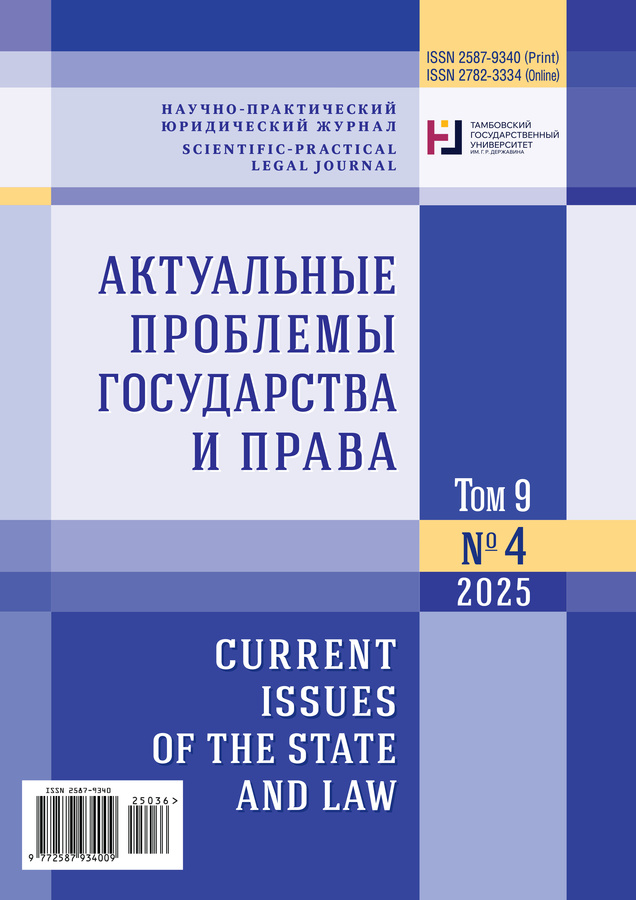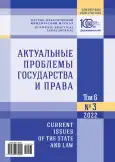Грани правомерного и уголовно-наказуемого применения сотрудниками полиции физической силы, специальных средств и огнестрельного оружия (по материалам судебной практики)
- Авторы: КУРСАЕВ А.В.1
-
Учреждения:
- Договорно-правовой департамент МВД России
- Выпуск: Том 6, № 3 (2022)
- Страницы: 349-361
- Раздел: Материальное право
- URL: https://journal-vniispk.ru/2587-9340/article/view/303828
- ID: 303828
Цитировать
Аннотация
Настоящее исследование посвящено квалификации случаев применения физической силы, специальных средств и огнестрельного оружия сотрудниками полиции. Цель – исследовать грани правомерного и уголовно-наказуемого применения сотрудниками полиции физической силы, специальных средств и огнестрельного оружия (по материалам судебной практики). Задачи – изучить нормы законодательства по применению сотрудниками полиции физической силы, специальных средств и огнестрельного оружия, проанализировать типичные квалификационные ошибки при оценке действий сотрудников полиции. Обращено внимание на то, что оценка правомерности действий сотрудников полиции имеет значение не только для квалификации их действий, но и поведения лиц, в отношении которых были применены указанные меры принуждения, относительно наличия в их действиях признаков состава преступления, предусмотренного статьей 318 Уголовного кодекса Российской Федерации. Сделан вывод, что подобные правоприменительные ошибки приводят к тому, что сотрудники органов внутренних дел применяют огнестрельное оружие только в самых крайних случаях, зачастую только тогда, когда создается непосредственная угроза жизни и здоровью самих сотрудников. Данная ситуация объясняется нежеланием полицейского быть обвиненным в незаконном применении оружия. Актуальность вопроса следует и из данных социологических опросов: подчеркнуто, что при уголовно-правовой оценке применения сотрудниками полиции физической силы, специальных средств и огнестрельного оружия в настоящее время учитывается и соблюдение ими положений Федерального закона от 7 февраля 2011 г. № 3-ФЗ «О полиции». Проблему практического применения Федерального закона от 7 февраля 2011 г. № 3-ФЗ «О полиции» и УК РФ составляют те случаи, когда положения Федерального закона от 7 февраля 2011 г. № 3-ФЗ «О полиции» огранивают права сотрудников полиции на применение физической силы, специальных средств и огнестрельного оружия, в то время как это необходимо и признается правомерным исходя из положений УК РФ.
Об авторах
Александр Викторович КУРСАЕВ
Договорно-правовой департамент МВД России
Автор, ответственный за переписку.
Email: kursaev@list.ru
ORCID iD: 0000-0001-9571-8207
кандидат юридических наук, главный эксперт-специалист
Россия, Российская Федерация, 119049 г. Москва, ул. Житная, 12АСписок литературы
- Побегайло Э.Ф. Избранные труды. СПб.: Юрид. центр Пресс, 2008. 1066 с.
- Rojek J., Alpert G.P., Smith H.P. Examining officer and citizen accounts of police use-of-force incidents // Crime and Delinquency. 2012. № 58 (2). P. 301-327.
- Bozeman W.P., Stopyra J.P., Klinger D.A. et al. Injuries associated with police use of force // Journal of Trauma and Acute Care Surgery. 2018. № 84 (3). P. 466-472.
- Осокин Р.Б. Правоохранительные органы в системе безопасности России. Тамбов: Изд-во Тамбов. гос. тех. ун-та, 2006. 56 с.
- Карабанова Е.Н. Квалификация незаконного применения насилия сотрудниками полиции // Законность. 2020. № 11. С. 48-52.
- Кириченко Ю.Н., Медведев А.В., Баринов А.С. О некоторых проблемах организационно-правовой специфики применения оружия сотрудниками полиции УМВД России по Белгородской области // Российский следователь. 2019. № 10. С. 54-58.
- Милюков С.Ф., Никуленко А.В. Причинение вреда при задержании лица, совершившего общественно опасное деяние. СПб.: Юрид. центр Пресс, 2015. 560 с.
- Милюков С., Никуленко А. Силовое противодействие преступному поведению: анализ модернизации нормативной базы // Уголовное право. 2012. № 6. С. 41-47.
- Необходимая оборона, крайняя необходимость, задержание преступника (правовая оценка действий сотрудников полиции) / отв. ред. Н.Г. Кадников. М.: Юриспруденция, 2012. 192 с.
- Баулин Ю.В. Право граждан на задержание преступника. Харьков: Вища школа, 1986. 157 с.
- Российское уголовное право. Общая часть / под ред. В.С. Комиссарова. СПб.: Питер, 2005. 560 с.
- Энциклопедия уголовного права. Т. 7. Обстоятельства, исключающие преступность деяния / Е.Г. Веселов [и др.]. СПб.: Издание проф. Малинина, 2007. 722 с.
Дополнительные файлы









